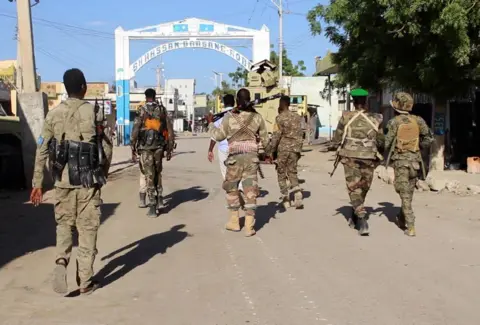In the heart of East Africa, amid the arid landscapes of Somalia, a fierce battle for control has erupted, drawing in U.S. forces and raising tensions in an already volatile region. As clashes continue to escalate over strategic towns, the role of U.S.-led airstrikes has become increasingly significant, marking a new chapter in the ongoing struggle against militant groups like Al-Shabaab.
The Context of the Conflict
The conflict in Somalia has deep historical roots, stemming from civil war and the rise of extremist groups. Al-Shabaab, an affiliate of Al-Qaeda, has been waging an insurgency since the mid-2000s, seeking to impose its interpretation of Islamic law across Somalia. Recent military advances by government forces, supported by the African Union Mission in Somalia (AMISOM) and U.S. airpower, have shifted the battlefield dynamics, with both sides vying for control over key territories.
The key town currently at the center of the conflict is strategically located, serving as a vital supply route and a potential stronghold for both government forces and militants. As clashes intensify, civilians are caught in the crossfire, leading to significant humanitarian concerns. The need for international intervention has never been more pressing, and the U.S. has responded with targeted airstrikes aimed at weakening Al-Shabaab’s operational capabilities.
The Role of U.S. Airstrikes
In recent weeks, U.S. forces have conducted several airstrikes across Somalia, targeting Al-Shabaab leaders and infrastructure. These precision strikes are designed to minimize civilian casualties while maximizing their impact on the militant’s command and control structures. Official reports indicate that over 40 strikes have been carried out this year alone, reflecting an increased commitment to combating terrorism in the region.
The airstrikes are part of a broader counter-terrorism strategy that aims to support Somali forces as they push to reclaim territory and rebuild governance structures. U.S. officials argue that such interventions are crucial for disrupting Al-Shabaab’s operational capabilities, reducing the risk of terrorist attacks not only in Somalia but also beyond its borders.
However, these military operations are not without controversy. Critics argue that increased airstrikes can lead to unintended civilian casualties, exacerbating the humanitarian crisis and potentially strengthening local support for militant groups. The challenge lies in balancing military objectives with the imperative to protect civilian lives.
Ground Realities and Humanitarian Consequences
As U.S. airstrikes continue, the ground situation remains dire. Civilians are fleeing conflict zones, facing displacement, and inadequate access to food and medical supplies. The United Nations has reported that millions of Somalis require urgent humanitarian assistance, and ongoing conflict hampers relief efforts.
In town centers, families are forced to abandon their homes and seek refuge in makeshift camps, often without basic necessities. The international community faces a critical decision: continue military support for Somali forces or prioritize urgent humanitarian assistance to avert a full-blown crisis.
Looking Ahead
The situation in Somalia is complex, shaped by decades of conflict and a struggle for power. While U.S. airstrikes may provide a temporary tactical advantage against Al-Shabaab, the long-term solution requires a multifaceted approach that addresses the underlying causes of violence and fosters political stability.
A sustainable peace will hinge on collaboration between local governments, international partners, and humanitarian organizations. As U.S.-Somalia airstrikes continue to unfold, the world watches closely, hopeful that this phase of the conflict may lead to a more stable and peaceful Somalia.
In conclusion, while military efforts are necessary to combat the immediate threat posed by Al-Shabaab, ensuring the safety and welfare of civilians must remain at the forefront of any intervention strategy. Only by combining military operations with compassionate humanitarian policies can the future of Somalia hope to change for the better.
Email Us on editorial@nnafrica.com













